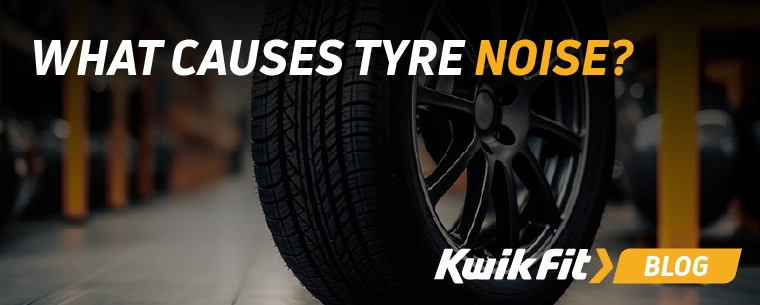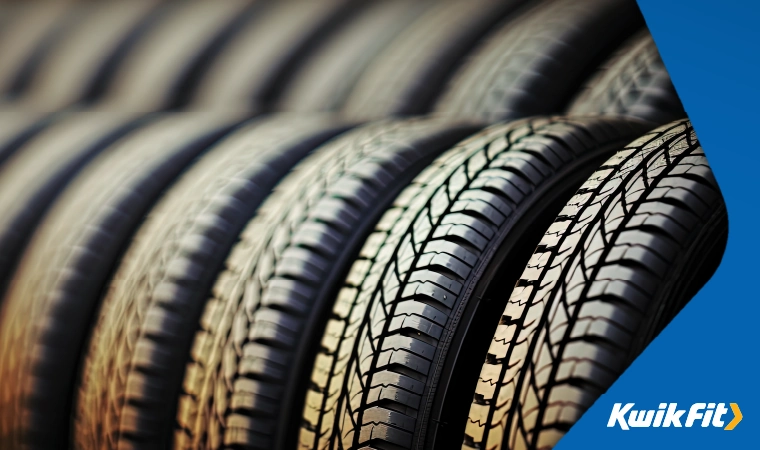What Causes Tyre Noise?
Jack Dreyer | Monday 25th November 2024 12:00pm

While all vehicles make noise while driving, some sounds can be a sign that your vehicle needs a maintenance check. Tyre noise is no exception here; while sometimes this can just be down to road conditions or the manufacture of individual tyres themselves (such as those designed to be quieter or noise cancelling tyres), other times this is a sign your tyres are damaged or misaligned.
If you’re unsure whether you need to have your vehicle checked or not, this guide will help to explain the different causes of tyre noise, so you can gain some peace of mind.
Types of tyre noise
If you drive regularly, then it’s good to be aware of different tyre noises and what they may mean. And, if you’re a driver of an electric vehicle with no regular engine noise, you’re likely to be even more aware of tyre noise. Typically, sounds from your tyres fall into three main categories:
- Squeaking - some tyre noise may simply be down to your driving style. For instance, if you take a corner too fast or brake hard without slowing your car down, then you may hear a squeak from your tyres. Whilst this isn’t necessarily a sign of damage to your tyres, you need to be aware that driving your car in a hard or aggressive way will make your tyre tread depth wear out more quickly.
- Humming - Some road noise from tyres is completely normal, with the most common type being tyre hum. This sound doesn’t necessarily indicate that there’s anything wrong with your car. However, should humming increase in volume, then it’s time to get your tyres checked out.
- ‘Womping’ - this wonderfully descriptive word is the term used to describe a loud, shuddering sound that may come on suddenly. If your tyres start to ‘womp’, this is a clear sign for a tyre check, as it may be that the structural supports of your tyres are damaged. If you hear this sound, you should pull over immediately.
When should you worry about tyre noise?
By itself, tyre noise may not always be a cause for concern, as it could just be down to your driving style. However, if it’s combined with one of the following issues, then you should seek immediate professional assistance:
- Steering becomes difficult
- You start to drift across the road
- You hear additional clanking noises
- Your tyres become worn or show bare tread

Causes of tyre noise
So, now we’ve looked at the different types of tyre noise, read on to learn what the possible causes may be.
- Tyre tread gripping the road - some car tyres are designed for the rubber to grip the road surface, which can create a sort of squealing sound.
- Air - sometimes air can get trapped underneath the rubber tread blocks, which can cause it to compress. The result is a small, popping-like sound. However, you may hear this as a sort of hum from your tyres because it can happen multiple times each second. It tends to be more common in tyres with large tread blocks that are separated by just a few thick grooves.
- Tread patterns - tyre ridges themselves can have a different effect on a road surface. Generally, the finer or more complex a tyre tread pattern is, the less noise it will make on the road.
- Uneven tyre wear - if your tyres wear down more on one side than the other, then the surface won’t consistently come into contact with the road, resulting in a noisy ride.
- Tyre alignment (tracking) issues - over time, it’s not uncommon for wheel alignment or tracking to shift. If this happens, then your drive will become bumpier.
- Tyre damage - most modern cars come equipped with tyre pressure sensors to warn you if one of your tyres is low on air. A burst or damaged tyre will also make a ‘womping’ sound and your vehicle will become much harder to drive.
What can you do to reduce tyre noise?
As a vehicle owner or regular motorist, there are a number of steps you can take to help reduce the causes behind tyre noise.
Replace your tyres
The best way to stop tyre noise in its tracks is to invest in new ones. You should consider the type of driving you do, as well as the seasons, when looking at buying new tyres for your vehicle. Where possible, It’s best to replace tyres in axel pairs.
Vehicle weight
Another factor that can help to reduce tyre noise is to reduce the weight of your vehicle. If your vehicle is heavily loaded, then it will push the bottom of its tyres flatter into the road surface. This will have a similar effect to your tyres being underinflated. An extra benefit of reducing your vehicle weight will mean you save on fuel efficiency too!
Air Pressure
Underinflated tyres can lead to increased tyre noise by causing uneven tyre wear. You should always ensure your tyres are correctly inflated, as this will also help to extend the life of your tyres.
A good tip is to also check them before you head off on any long journeys. Most cars have labels inside the door to inform the correct tyre pressures for your vehicle, or you can also use an online tyre pressure tool by entering your registration number.
Get your tyres checked at Kwik Fit
If you’re worried about the tyre noise or the condition of their tread, Kwik Fit offers a no-obligation free tyre check. Our expert technicians will be on hand to provide advice and recommendations for the best-fit replacements. With 600 centres nationwide to choose from, there’ll be a Kwik Fit local to you. All helping you to stay safe behind the wheel.
For more tips about driving in tyre safety including the risks of pot holes, check out the Kwik Fit blog.
Any facts, figures and prices shown in our blog articles are correct at time of publication.
Featured Articles
Is it Illegal to Drive With One Headlight?
Saturday 19th July 2025
Wondering if it’s illegal to drive with one headlight? Learn about the safety risks and penalties of illegal blown bulbs and why you should fix them promptly.
Air Con in EVs & Hybrids: Experts Answer Your Questions
Monday 30th June 2025
Does air con drain EV batteries? Can you use the air con while charging an electric car? Find out the answers to these questions & more from Kwik Fit’s experts.
Why Is Your Car Making a Noise? Fixes & Tips
Friday 13th June 2025
When your car starts making unexpected noises, it can certainly be quite disconcerting; it may be nothing to worry about, but here’s what you need to know.









